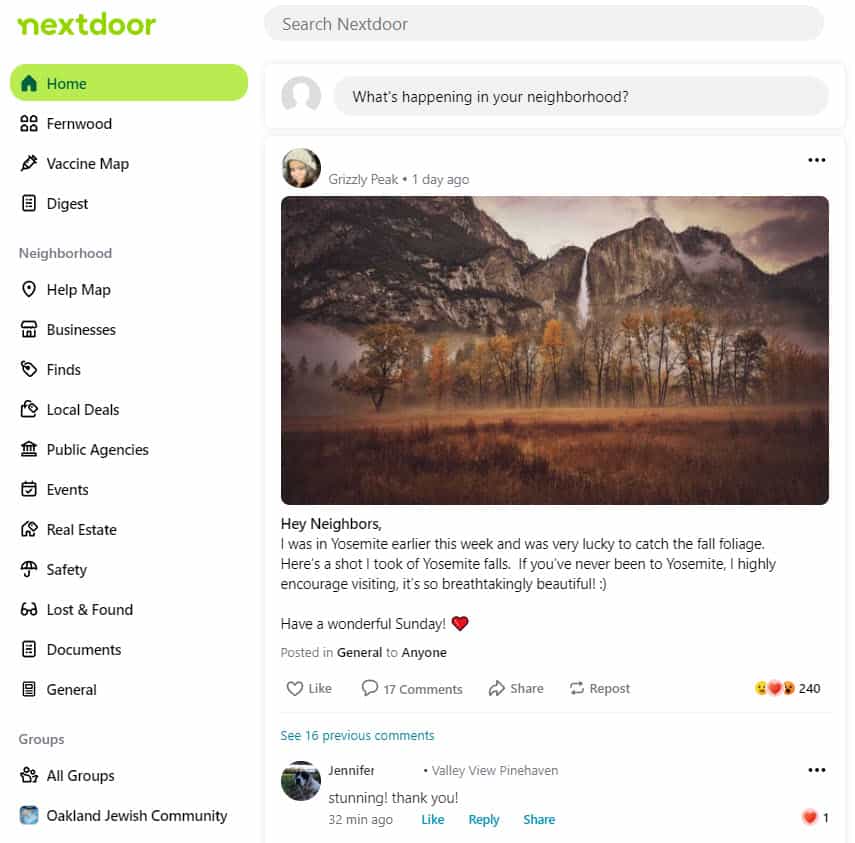Nextdoor: The Antidote To The Metaverse
Imagine a social network where you actually know everyone you interact with?
Imagine a social network where you trust all the people you talk with?
Imagine a social network where kindness is more important than anger?
Imagine a social network that’s local and not remote?
Imagine a social network that talks about dogs, and cats, and flowers, and nice things in life?
Imagine a social network that doesn’t make money based on how angry you get?
Imagine a social network that grows because of its utility, not because it gets your lizard brain addicted?
This social network exists.
It’s called Nextdoor, and it’s The Antidote to the Metaverse.
Last week Nextdoor, one of the fastest-growing social networks in the world, went public and is now worth $4.3 Billion. This amazing company (Stock Ticker is KIND) is different and unique from Facebook and all its competitors. It is already used by one in three households in the United States, and it’s the only social network where you can’t “unfriend” your connections. Because they’re your neighbors.
I talked with the Nextdoor team last week and they convinced me how important they are. Unlike Facebook, which thrives on anger and clickbait, Nextdoor is here to connect you to your neighbors. And this is an important aspect of our lives.
Robert Putnam, one of my favorite researchers, wrote two important books: Bowling Alone, written in the year 2000. And The Upswing, published last year. His books chronicle the breakdown of communities and neighborhoods in America and paint a sad but hopeful look at how we have lost our friends, neighbors, and relationships in the digital age. He believes we are coming back together, and maybe Nextdoor can help this all happen.
What is a neighbor? As Bryan Power, the CHRO of Nextdoor put it, a neighbor is someone who will take in your mail or help you with a flat tire, regardless of their politics. They’ll watch out for your house if there’s a fire, and they’ll get to know your kids if they run into the yard. Neighbors are our friends and our acquaintances, and we treat them with reverence and respect – because they live on our block, they use our streets, and we watch their families grow.
And neighbors have a lot in common. We are all interested in fixing the same potholes. We all want the local bagel shop to thrive. And we all want our local city services to keep our streets safe, lighted, and healthy. In fact most of us who grew up in the 1960s and 1970s made best friends with our neighbors, becoming our very best friends as children.
Nextdoor is bringing this to the internet. Unlike Facebook, which seems to aggressively connect us to people we don’t know (in a never-ending effort to amass data and sell us ads), Nextdoor requires that you identify yourself, give away your address, and become “yourself” to your neighbors. And the company has created all sorts of tools to prevent the slide into chaos we see on Facebook and Twitter.
For example, Nextdoor has a “Kindness Reminder” feature, that slows down your angry post. If it senses you’re about to say something controversial, it asks you to slow down and double-check that you really want to post. According to the company, almost 30% of all posts are “cooled” by this feature.
Nextdoor has community moderators. These hard-working people volunteer to moderate discussions in your neighborhood, and they are your neighbors too.
 |
Yes, Nextdoor sells ads. The company is generating almost $185 Million in revenue this year and growing at over 60%. But the ads are designed to be local – for local services, local products, and home offerings you probably want anyway. And yes you can sell stuff on Nextdoor, you can upload pictures of your cat or dog, and you can complain that someone stole your mail or a dog is barking all night.
I’ve studied Facebook and corporate social networks for decades, and the big “flaw” in Facebook (and Twitter) is this idea that “everyone should be connected.” There really is no value in me expressing my opinions to someone I don’t know when they haven’t asked. Yet Facebook and Twitter thrive on this kind of stuff. They reward our “Lizard Brain” with a “like” or a “follow,” teaching us like Pavlov’s dogs to want more and more and more.
Nextdoor doesn’t work that way. Yes, you can choose to post inflammatory things, but people just don’t want to read it. And your neighbors will see that you’re a crank. So the incentives are focused on kindness, and that’s something we all need.
I’m a big fan of this company, and I hope they teach us a lot of lessons. The company is poised to make a lot of money (there are a myriad of businesses and community services that would like to serve communities directly) and I think they’ll do it in a nice way.
And as for The Metaverse, I just heard Hans Zimmer say something funny on Kara Swisher’s podcast.
If he were to create a musical theme for The Metaverse, he thinks it would be a dentist’s drill.
I certainly hope that won’t happen, but let’s consider Nextdoor the antidote to a “virtual life.” After all, we live in the real world, and it’s pretty nice when you get out and enjoy it.
As we enter the holiday season, let’s all reward Kindness in everything we do. Nextdoor is a great place to start.
Additional Resources About Nextdoor
How Moderation Works On Nextdoor
How Nextdoor Went Public And The Company Defines $KIND
The #WalWithMe Movement And How To Meet Real People Online
Nextdoor for Public Sector Agencies
Nextdoor Pro-Inclusion And Anti-Racism Policies


